| Srl | Item |
| 1 |
ID:
156107
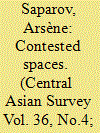

|
|
|
|
|
| Summary/Abstract |
This article deals with the political manipulation of symbolic landscape, using post-Soviet Azerbaijan as a case study. In particular, it looks at the practice of toponym changes as an element of political legitimization and national identity-making. The political use and manipulation of place-names and symbolic landscape is a relatively recent phenomenon that became particularly widespread in the twentieth century. It is widely used for ideological or nationalist purposes throughout the world – from Iran to Israel, from former Yugoslavia to the USSR. However, I argue that post-Soviet Azerbaijan represents an unusual case where one can clearly see strikingly different patterns of place-name manipulation in the pursuit of political legitimacy. It argues that while questions of political legitimacy and nationalism found their reflection in the policy of place-name manipulation, their uses followed clearly different routes and were confined to separate areas.
|
|
|
|
|
|
|
|
|
|
|
|
|
|
|
|
| 2 |
ID:
182830
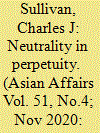

|
|
|
|
|
| Summary/Abstract |
Since the passing of Turkmenistan's first president, Saparmurat Niyazov, in late 2006, Gurbanguly Berdymukhamedov has ruled over Turkmenistan. Although authoritarian regimes occasionally undergo reform following a transition from one leader to the next, the dictatorship in Ashgabat remains intact and Berdymukhamedov has not modified his predecessor's foreign policy doctrine. Why though has Turkmenistan chosen not to revise its “permanent neutrality” status under new leadership? This article stipulates that the ruling elites in Ashgabat have preserved Turkmenistan's neutrality for three reasons. First, in contrast to other isolated dictatorships, the government of Turkmenistan does not have to contend against any state adversaries or antagonize a foreign power to legitimate its rule. Instead, Turkmenistan portrays itself in the United Nations General Assembly as an exemplary neutral state and this affords the regime latitude in navigating geopolitics. Second, while Berdymukhamedov has revised aspects of the Niyazov dictatorship, the Arkadag personality cult heralds him as the “protector” of Turkmenistan's sovereignty. “Permanent neutrality” thus undergirds the president's political legitimacy to some degree. Third, Turkmenistan's neutrality contributes to the ruling elites' maintenance of a corrupt and repressive regime through which they exert control over the economy. Hence, in spite of many challenges facing the country, the ruling regime will likely endure.
|
|
|
|
|
|
|
|
|
|
|
|
|
|
|
|
| 3 |
ID:
178805
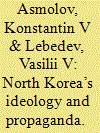

|
|
|
|
|
| Summary/Abstract |
This article explores the evolution of the DPRK’s ideology and propaganda
and the channels of their transmission during Kim Jong-un’s rule. The
authors highlight several distinguishing features/markers of new trends in
the DPRK’s current ideology and propaganda.
The study indicates that the demand for change is related with both
changes in Kim Jong-un’s governance style and the current realities, such
as North Koreans’ growing knowledge about the outside world and external
information pressures.
The most significant trends in North Korea’s ideology today are: departure
from the term sŏngun; the use of the umbrella term ‘ideas of Kim Il-sung-Kim
Jong-Il’; lower level of Kim Jong-un’s personality cult in contrast to that
of the previous two leaders; an attempt to delineate a watershed between
purely metaphorical descriptions and qualities of the leaders and their real
abilities; growing attention to domestic problems and greater openness in
the discussion of pressing issues; new methods of propaganda (including
social networks) addressed to the foreign audience.
|
|
|
|
|
|
|
|
|
|
|
|
|
|
|
|
| 4 |
ID:
161158
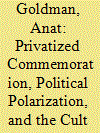

|
|
|
|
|
| Summary/Abstract |
This article explores the current ambiguous position of the cult of Atatürk in Turkish society and politics, as both a state cult that is not entirely desired by the ruling party and a fragmented and contested people’s cult. The article argues that the commodification and personal appropriation of the cult of Atatürk in the 1990s and 2000s blurred the lines between state and society and between political ideologies, eventually turning the cult into a much more inclusive realm than before, which enables debating national identity in Turkey despite the contentious political environment.
|
|
|
|
|
|
|
|
|
|
|
|
|
|
|
|
| 5 |
ID:
169284
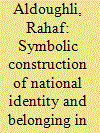

|
|
|
|
|
| Summary/Abstract |
This article investigates the relationship between the construction of masculinist national identity and the perpetuation of nationalist songs after the ascendance of the Syrian Bàth regime. Popular in schools and Bàth-affiliated organisations, and performed on national holidays and festivals, nationalist songs are an important component of Syrian oral culture. They are premeditated to construct a particular perception of national belonging and identity. Covering two different periods (the 1973 war to1990 and 1990–2007), the article examines the ways these songs construct the nation around the normalisation of sacrificial death and argues that, through the perpetuation of masculinist values as key characteristics of national belonging and identity, these songs obscure women’s status in Syrian political culture and contribute to their subordination.
|
|
|
|
|
|
|
|
|
|
|
|
|
|
|
|